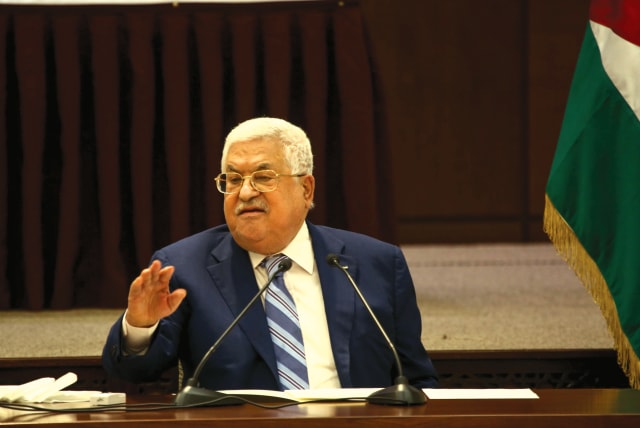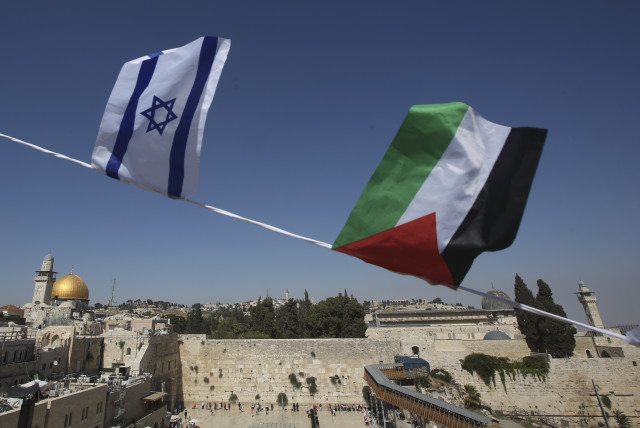Clarity of intentions, actions of consequence is what is required - opinion

Without finding the moral courage and fortitude to take such actions, the situation could become much worse than it already is.
It is essential to understand that there is no symmetry in the Israeli-Palestinian conflict between Israel and Palestine. Israel is the occupier; Palestine is the occupied. Israel is powerful, Palestine is weak. Israel acts unilaterally and does whatever it wants in complete disregard of international law. Palestine is unable to do anything against Israel because Israel has almost total impunity in the international community. In the contest between the two sides on victimhood, the knock-down winner is Palestine.
I write this column accepting the adage that we shouldn’t blame the victim. I am not blaming the victim, but I am also not relieving the victim of their responsibility to change their own situation.
Elections in Palestine
Let’s begin with the easy part: elections. The overwhelming majority of Palestinians want elections for a new leadership. The last elections for the Palestinian Legislative Council (the Parliament) were held in 2006. The last elections for Palestinian president were held in 2005. President Mahmoud Abbas could be the best president in the world, but no president should be in office for so long, and certainly should not be in office for so long without a clear mandate from the people.
As most Palestinians explain to me, the path toward reunification of Palestine, between the West Bank and Gaza, goes through elections. There is an understanding, perhaps even an undertaking, that whoever wins those elections, wins. The Palestinians want to put an end to the internal division and they want new elected leaders. So, take to the streets, let your voices be heard throughout Palestine – peaceful, awe-inspiring masses of people taking to the streets with a one-word slogan: Elections!
A more complex and difficult talk
The second call from me is more complex and more difficult. In the decades that I have brought thousands of Israelis and Palestinians together for serious in-depth discussions and negotiations, it is clear that the two sides transmit their messages on different wavelengths.
Israelis talk about peace and recognition. They also talk about ending the conflict. Palestinians talk about ending the occupation, freedom, justice and independence. In the recent past, many young Palestinians also talk about equality.
Many Israelis believe that negotiations and reaching agreements is the best way of reaching their goal of peace. Many Palestinians simply want Israel to get out of their lives and end the occupation. The reality on the ground is one in which the occupation gets more entrenched, new settlements are being built, old settlements are constantly expanding.
The road infrastructure in the West Bank is changing dramatically and rapidly in a way to prevent the viability of a Palestinian state. This has always been the goal of the settlement movement. They have maybe already achieved that goal, and if not, it will happen soon.
WHAT I have almost never heard from Palestinians is how they expect to achieve their goals of ending the occupation, and gaining justice, freedom, independence and equality. For many years they depended on the Arab world. That did not happen. They hoped that the international community would force Israel to end the occupation.
Then the Soviet Union disappeared and the non-aligned nations had only the power to pass empty declarations in the United Nations General Assembly. Then came the peace process, Madrid, multilateral talks, Oslo, bilateral negotiations, and signed agreements – but the house of cards came crashing down.
The Palestinians received huge amounts of money from the US, the EU, and many nations provided donor aid. But in retrospect, that enabled Israel to continue with a much more comfortable occupation, and gave the international community the sense that it was in fact helping to end the occupation and leading Palestine to freedom. But there was never any real pressure on Israel to withdraw or even to stop settlement building. Additionally, Palestinian governance became increasingly corrupt; that is what the Palestinian people say themselves.
One month before the 1977 visit of Egyptian President Anwar Sadat to Israel, an overwhelming majority of Israelis preferred keeping Sinai and not having peace. One month following Sadat’s historic visit, an overwhelming majority of Israelis were willing to give up every grain of Sinai’s sand in order to have peace.
A lot of sand storms have blown across Sinai since then, and Israeli-Egyptian peace is far from the vision of peace that existed in the 1980s, but almost no Israelis even contemplate retaking Sinai and giving up on peace.
The most important lesson of that past experience for the Palestinians should be that the address to speak to is next door, in Israel, to the Israeli people. The international community will not come to the rescue – not the US, EU, Russia, China, UN, or Arab states.
Yes, it is very likely that Israel will face new pressure as a result of its own criminal behavior against the Palestinian people. But that pressure could take many years before it leads to a change of policy and public views in Israel. Yes, Israel has become an apartheid-like state, but before the international community develops an effective policy stream against Israel, a very long time will pass and Palestinian suffering will surely increase beyond anything that should be tolerable.
I will not tell the Palestinian people and their leaders what to do and say. I know what those Israeli people who are sincerely interested in peace and in ending the occupation would like them to do, and what they would like to hear from them.
I have, from time to time, heard some Palestinians say, without apprehension: yes, we recognize that the Jewish people are connected to this land. I have heard some Palestinians make clear statements without any ifs, ands, or buts – the Holocaust was the greatest crime against humanity ever committed and we recognize the suffering of the Jewish people and understand their need for real security.
I have even heard some Palestinians criticize the Palestinian curricula for teaching hatred against Israel and against Jews, and have called for textbook reform. That does not mean changing the Palestinian narrative, which is largely based on their suffering at the hands of Israel. But, they say, the curricula should also teach the desire of the Palestinian people to live in peace as neighbors with Israel.
If the overwhelming majority of Palestinians believed in these things and voiced them, I believe the Israeli response to them would be very powerful and meaningful for our shared future here.
Perhaps the next generation of Palestinian leaders, those whom we know and those who are unknown to us, could take some dramatic steps that would have the “Sadat impact” on the Israeli psyche and public opinion. Faisal el Husseini thought that when he visited the Ghetto Fighters’ Museum at Kibbutz Lohamei Hagetaot there would be a “Sadat impact” moment. It did not happen.
Rabin-Arafat handshake was powerful moment on Israeli opinion
The Rabin-Arafat handshake was very powerful on Israeli public opinion, but the majority of Israelis still had great reservations about Arafat’s real intent – too many of his messages were clouded with doublespeak.
Clarity of intentions and actions of consequence is what is required. I know it is very difficult for the occupied to stand up and find the moral courage and fortitude to take such actions, but I am truly afraid that without something along these lines, our situation will become much, much worse than it already is.
This article has appeared in Arabic in the Palestinian daily newspaper Al Quds. The writer is a political and social entrepreneur who has dedicated his life to peace between Israel and her neighbors. He is a founding member of Kol Ezraheiha-Kol Muwanteneiha (All of the Citizens) political party in Israel. He is now directing The Holy Land Bond and is the Middle East Director for ICO, the International Communities Organization.
Jerusalem Post Store
`; document.getElementById("linkPremium").innerHTML = cont; var divWithLink = document.getElementById("premium-link"); if (divWithLink !== null && divWithLink !== 'undefined') { divWithLink.style.border = "solid 1px #cb0f3e"; divWithLink.style.textAlign = "center"; divWithLink.style.marginBottom = "15px"; divWithLink.style.marginTop = "15px"; divWithLink.style.width = "100%"; divWithLink.style.backgroundColor = "#122952"; divWithLink.style.color = "#ffffff"; divWithLink.style.lineHeight = "1.5"; } } (function (v, i) { });

